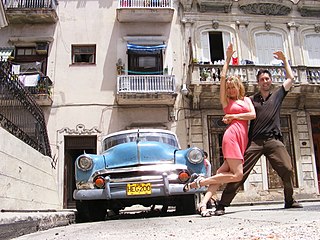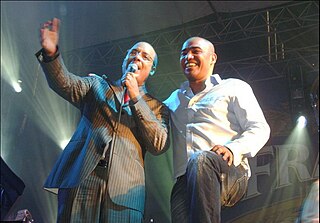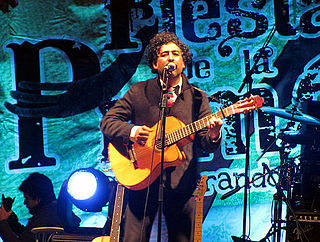
Bronco is a Mexican grupero band originating from Apodaca, Nuevo León. Their modern take on regional Mexican music in the 1980s and 1990s helped earn them international recognition with original band members José Guadalupe "Lupe" Esparza, Ramiro Delgado, Javier Villareal, and José Luis "Choche" Villareal creating music that would go on to top record charts. The band is well known for their use of modern instruments, particularly the synthesizer and musical keyboards, as part of the incorporation of pop-style music. As with many grupera bands, members wore matching jumpsuits.

Bachata is a genre of music that originated in the Dominican Republic in the 20th century. It contains elements of European, indigenous Taino and African musical elements, representing the cultural diversity of the Dominican population.
The National Organization of the Anvil or simply El Yunque is the name of an alleged conservative Mexican secret society whose existence was first claimed by journalist Alvaro Delgado in 2003.

Timba is a Cuban genre of music based on Cuban son with salsa, American Funk/R&B and the strong influence of Afro-Cuban folkloric music. Timba rhythm sections differ from their salsa counterparts, because timba emphasizes the bass drum, which is not used in salsa bands. Timba and salsa use the same tempo range and they both use the standard conga marcha. Almost all timba bands have a trap drummer. Timbas also often break the basic tenets of arranging the music in-clave. Timba is considered to be a highly aggressive type of music, with rhythm and "swing" taking precedence over melody and lyricism. Associated with timba is a radically sexual and provocative dance style known as despelote. It is a dynamic evolution of salsa, full of improvisation and Afro Cuban heritage, based on son, Rumba and mambo, taking inspiration from Latin jazz, and is highly percussive with complex sections. Timba is more flexible than salsa and includes a more diverse range of styles. Timba incorporates heavy percussion and rhythms which originally came from the barrios of Cuba.
ISO 690 is an ISO standard governing bibliographic references in different kinds of documents, including electronic documents. This international standard specifies the bibliographic elements that need to be included in references to published documents, and the order in which these elements should be stated.

Héctor Luis Delgado Román is a Puerto Rican rapper, singer, and record producer, formerly known by his stage names Héctor el Father and Héctor el Bambino. He rose to fame as a member of the duo Héctor & Tito. As a producer, Delgado has worked with several reggaeton producers, as well as Emilio Estefan.

Kingdom of Heaven is the soundtrack to 2005 Ridley Scott motion picture of the same name. The soundtrack was composed, co-orchestrated and conducted by Harry Gregson-Williams, and performed in large part by Gavyn Wright and the London Session Orchestra, and released by Sony Classical on April 26, 2005. It is a medley of choral hymns featuring Catherine Bott and Iestyn Davies, instrumentals and percussions, and full orchestral performances.

Issac Delgado is one of the founders of the band NG La Banda and is a popular salsa and timba performer.

Javier Arnaldo Portillo Martínez is a Honduran professional football player who plays as a left midfielder for Naranja Mecánica in the American ISLANO league.

Ojalá Que Llueva Café is the fourth studio album by Dominican singer-songwriter Juan Luis Guerra released in 1989 by Karen Records. It is considered one of his most emblematic and important albums. The album set the musical path for his later albums, re-formulating Dominican merengue and bachata music through the contemporary elements of pop, rock, salsa, or jazz. Incorporating socially conscious lyrics with danceable merengues and romantic-poetic bachatas, the album is considered one of the most important albums of his discography.
Luis Miguel Carrión Delgado is a Spanish former professional footballer who played as a right-back, currently manager of Real Oviedo.
Ali ibn Attiya ibn al-Zaqqaq was one of the great poets of Al-Andalus during the reign of the Almoravids. He was a Muslim from Banu Lakhm. His mother was the sister of fellow Andalusian poet, Ibn Khafaja, and there is scholarly dispute regarding his father. He was a disciple under philosopher Ibn Ṣîd de Badajoz.
Ali ibn al-Qasim al-Zaqqaq, from Fes, Morocco is one of the most important authors in the field of Maliki common law. He is the author of the well-known Lamiyat al- Zaqqaq, a textbook on judicial procedures (Amal). al-Manhaj al-muntakhab is another work by al-Zaqqaq on Maliki fiqh. al-Lulu al-masun fi sadaf al-qawaid al-uyun is the verse summary of al-Zaqqaq's, al-Manhaj al-muntakhab and the commentary of Ahmed Mohammed al-Maqqari (1632) upon it.

The Popular Democratic Party is a political party in Puerto Rico that advocates to continue as a Commonwealth of the United States with self-governance. The party was founded in 1938 by dissidents from the Puerto Rican Liberal Party and the Unionist Party and originally promoted policies on the center-left. In recent years, however, its leaders have described the party as centrist.

Grandes Éxitos de Juan Luis Guerra y 440 or simply Grandes Éxitos is a compilation album of Dominican singer-songwriter Juan Luis Guerra, and his band 440 released in July 1995 by Karem Records. It contained Guerra's fifteen biggest hits from 1988 to 1994 on the original version and from the albums Mudanza y Acarreo(1985) to Fogarate! (1994) on the international versions. The compilation receive positive reviews by the critics.

Manuel Javier García Herrera is a folk-pop Chilean singer-songwriter and guitarist. He has won several awards and has twice received the Chilean National Music Prize, awarded by the Chilean Government.
Chilean electronic music refers to the electronic music genre and its subgenres produced in Chile or by Chileans.

Bolívar, Man of Difficulties is a 2013 Venezuelan film directed by Luis Alberto Lamata. The film is based in the obstacles that Simón Bolívar had to face in 1815 and 1816. It stars Roque Valero, who plays Bolívar.
Neoperreo is a subgenre of reggaeton with some degree of popularity in Los Angeles, Mexico City, and Chile. Among the most prominent acts of the scene are Tomasa del Real from Chile and Ms Nina from Argentina. Within the United States, neoperreo is more popular in Los Angeles than in Miami, where traditional reggaeton prevails. Red Bull Music has been significant patron of neoperreo artists.

Álvaro Luis Delgado Ceretta is a Uruguayan veterinarian and politician of the National Party (PN), who served as the 18th Secretary of the Presidency of the Republic from 2020 to 2023. He also previously served as National Representative from 2005 to 2015, as well as Senator from 2015 to 2020. He is a candidate in the 2024 National Party presidential primaries for president of Uruguay in the 2024 general election.













